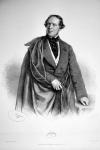Biography
Baron Eligius Franz Joseph von Münch-Bellinghausen (German: Eligius Franz Joseph Freiherr von Münch-Bellinghausen) was an Austrian dramatist, poet and short-story writer of the Austrian Biedermeier period and is more generally known under his pseudonym, 'Friedrich Halm'.
Life and Career
He was the son of a district judge at Kraków in Poland, at this time part of the Austrian Empire. Early in his literary career he adopted the nom de plume of Friedrich Halm ("Halm" means a blade of grass or a blade of straw), and became one of the most popular dramatists in Vienna around the middle of the 19th century. His novellas are now regarded as more significant from a literary point of view than his dramatic writings.
Münch-Bellinghausen was educated at the seminary of Melk Abbey and later at Vienna, where he studied philosophy and jurisprudence, and where he began his career in 1826.
As a boy he took a keen interest in the theater and from 1833 enjoyed the friendship of his former teacher, the Benedictine Michael Leopold Enk von der Burg, who encouraged the poet to offer his drama Griseldis to the Hofburg theatre. Its successful production in 1835 established Halm's reputation as a playwright and henceforth he continued to write for the stage with varying success.
Münch-Bellinghausen becam Regierungsrat (government councillor) in 1840 and Kustos (chief keeper) of the Court Library in 1844, a position that Grillparzer had sought in vain. He was elected member of the Austrian Academy of Sciences in 1852 and life member of the Austrian House of Lords in 1861. In 1867 he was appointed superintendent of the two court-theatres, but three years later resigned this position which disputes had made distasteful to him. His health also had been failing.
Literary Work
Of his many dramatic works the best known are Griseldis (1837); Der Adept (1836; publ. 1838), Camoens (1838), Der Sohn der Wildnis (1842), and Der Fechter von Ravenna (1857). Griseldis is based on the well-known story of the faithful wife whose loyalty and devotion are put to the severest tests but who triumphs in the end. Der Sohn der Wildnis ("The Son of the Wilderness") is a romantic drama depicting the power of womanly love and virtue over rude barbarian strength. It was presented on the English stage under the title of Ingomar the Barbarian. Der Fechter von Ravenna ("The Gladiator of Ravenna"), regarded as one of Halm's best dramas, is a tragedy having for its hero Thumelicus the son of Arminius, the liberator of Germany from Roman rule. All of these are distinguished by elegance of language, melodious versification and clever construction, and were for a time exceedingly popular.
Theatrically these plays are very effective, but the characters are improbable and the situations are often strained. Their popularity, which they owe largely to their smooth, polished and beautiful diction and skillfully interspersed lyrics, has not been lasting. Of Halm's numerous other dramas we may mention the vivid and powerful Sampiero (1856, depicting the tragic loss of humanity attendant upon political fanaticism); Iphigenie in Delphi (1856); Begum Somru (1863); Wildfeuer (1864); a German version of Shakespeare's Cymbeline that appeared on the stage in 1842, and an extremely effective and humorous comedy entitled Verbot und Befehl ("Prohibition and Command", 1856).
He is also the author of lyrics, short stories, and of a narrative poem Charfreitag ("Good Friday") (1864). His poems, Gedichte, were published in Stuttgart, 1850 (new ed. Vienna. 1877). His stone bust still sits on top of the famous Burgtheater in Vienna, alongside those of Schiller, Goethe and Grillparzer.
Halm's short stories, or novellas, which tend to focus on spiritual issues and self-destructive monomaniacal characters, are far superior to most of his dramas and are striking and impressive in content, full of psychological insights - especially his earliest major story, Das Auge Gottes ("The Eye of God"), written in 1826, about the supernatural reverberations of the blasphemous act of the desecration of a holy icon, and his final narrative masterpiece, Das Haus an der Veronabrücke ("The House on Verona Bridge"), centring on the inner collapse of a man given over to one overriding "idée fixe". His novella, Die Marzipanliese ("Marzipan Lise"), is credited with being one of the first "criminal fiction tales" of German literature and is now available as an audio book on CD. Furthermore, the composer, Brahms, used some of Halm's verse as the basis for a number of his Lieder.
Overall it can be said that it is as a short-story or 'novella' writer that Halm has secured a place in the history of German/Austrian literature. His novellas mark Halm out as a writer of talent, psychological penetration and substance. His novella, The House at Verona Bridge (Das Haus an der Veronabruecke) alone stands as a milestone in 19th-century Austrian literature for its probing and insightful treatment of an obsessive mentality that inevitably leads to tragedy and death.
His collected works, Samtliche Werke, were published arranged in chronological order in eight volumes (1856-1864), to which four posthumous volumes were added in 1872. Also published was Ausgewählte Werke, ed. by A. Schlossar in 4 vols. (1904). ..






